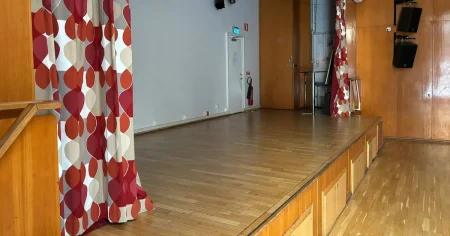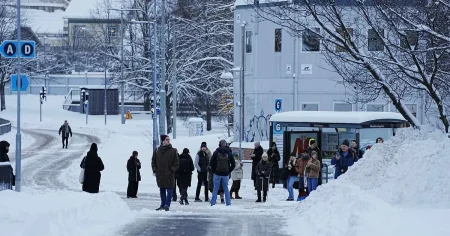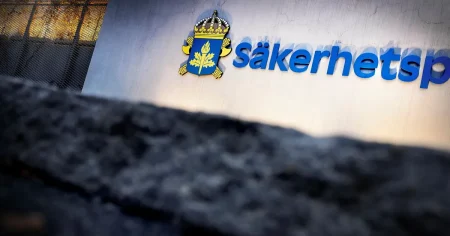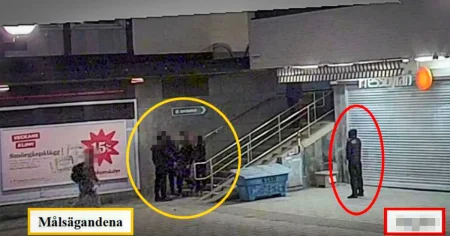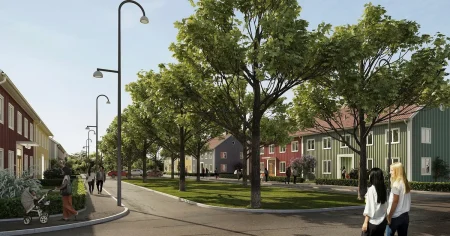The fall of the Assad regime in Syria sparked celebrations amongst hundreds of supporters in Stockholm, Gothenburg, and Malmö over the weekend. Joyful tears, embraces, and fervent flag-waving filled Sergels Torg in Stockholm, mirroring similar scenes in other Swedish cities. This jubilation, however, is tempered by the complex reality of the situation in Syria. The takeover is spearheaded by Hayat Tahrir al-Sham (HTS), a designated terrorist organization, although several other groups are involved. Aron Lund, a Middle East analyst at the Swedish Defence Research Agency (FOI), predicts HTS will likely lead the formation of a new government in Damascus, potentially using proxy figures due to their radical ideology and terrorist designation, which limits their appeal among Syrians. The security situation remains uncertain, with HTS media channels urging restraint and discouraging violence and looting, suggesting potential concerns about maintaining order.
The volatile situation prompted the Swedish Foreign Minister to urge the few hundred Swedes currently in Syria to leave the country. The Ministry of Foreign Affairs advises against all travel to Syria, reiterating its call for Swedes to depart. This recommendation underscores the precarious security landscape and the potential dangers for foreign nationals. While celebrations continue abroad, the reality on the ground requires careful monitoring and assessment. The transition of power and the involvement of HTS raise significant concerns about the future of Syria and the potential for further conflict and instability.
The Swedish Democrats (SD), a right-wing political party, have seized on the changing situation in Syria to call for a pause on asylum applications from the country. SD party leader Jimmie Åkesson stated on X (formerly Twitter) that the regime change presents a prime opportunity for celebrating Syrians in Sweden to return home. The party echoes the Ministry of Foreign Affairs’ assessment of the precarious security situation but suggests it could evolve. Ludvig Aspling, SD’s migration policy spokesperson, argues that asylum applications should be halted as they are based on the situation in the applicant’s home country, which is currently in flux. He emphasizes that this pause doesn’t equate to immediate expulsion of asylum seekers.
Aspling clarifies that the proposed pause aims to facilitate a reassessment of refugee statuses and residence permits, particularly for individuals whose need for protection may no longer exist. He stresses, however, that this process requires time and a careful evaluation of the stability and cessation of hostilities under the new regime. Echoing Åkesson’s sentiment, Aspling contends that Syrians celebrating the new regime have little justification for remaining in Sweden. This position aligns with the SD’s long-standing stance on immigration and reflects their belief that individuals should return to their home countries once the conditions that prompted their asylum claims are no longer present.
The SD’s position raises important legal and ethical questions. According to EU law, a durable improvement in a country’s situation is required before residence permits can be re-evaluated. Whether the current change in Syria constitutes such an improvement remains to be seen. The complexities of the situation, including the involvement of a designated terrorist group in the new government, demand a cautious and nuanced approach. Simply equating celebrations with a desire to return and thereby revoking asylum status could overlook the individual circumstances and potential risks faced by those returning to a country still grappling with the aftermath of a protracted conflict.
The celebrations in Sweden highlight the complex and often conflicting emotions surrounding the situation in Syria. While some celebrate the fall of the Assad regime, others express concerns about the nature of the new leadership and the potential ramifications for the country’s future. The unfolding events in Syria require ongoing monitoring and careful consideration of the legal and humanitarian implications for those seeking refuge from the conflict. The Swedish government’s cautious approach and its call for Swedes to leave the country reflect the uncertainty and potential dangers that remain. The SD’s call for a pause in asylum applications and repatriation of those celebrating the new regime, while politically charged, underscores the ongoing debate about immigration and asylum policies in the context of a rapidly changing global landscape.







